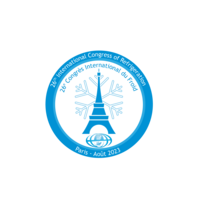
Recommandé par l'IIF / Document IIF
Étude expérimentale sur la vaporisation de gouttes d’eau impactant une paroi chauffée dans des conditions de basse pression.
Experimental study of the vaporization of water drops impacting a heated wall under conditions of low pressure.
Numéro : 0210
Résumé
Water is an environmentally-friendly refrigerant but the vaporization phenomena occurring when under low pressure in evaporators are not well documented. This communication aims at unveiling experimentally some features of the vaporization of water drops on a heated horizontal surface at a controlled pressure. A heat flux sensor was used to record the thermal signature of the process that was observed with a high-speed camera. The liquid volume was controlled by a peristaltic pump and injected through a needle located at a variable height. The influence of the temperature of the surface was investigated. Four regimes of vaporisation were distinguished. Conditions for their occurrence were discussed. One remarkable regime ("explosive boiling") is characterized by the bursting of a large bubble generated inside the drop, which results in atomization of the mother drop and spreading of the daughter drops. Explosive boiling might have the potential to increase the efficiency of low-pressure evaporators.
Documents disponibles
Format PDF
Pages : 12 p.
Disponible
Prix public
20 €
Prix membre*
Gratuit
* meilleur tarif applicable selon le type d'adhésion (voir le détail des avantages des adhésions individuelles et collectives)
Détails
- Titre original : Experimental study of the vaporization of water drops impacting a heated wall under conditions of low pressure.
- Identifiant de la fiche : 30031587
- Langues : Anglais
- Sujet : Technologie
- Source : Proceedings of the 26th IIR International Congress of Refrigeration: Paris , France, August 21-25, 2023.
- Date d'édition : 21/08/2023
- DOI : http://dx.doi.org/10.18462/iir.icr.2023.0210
Liens
Voir d'autres communications du même compte rendu (491)
Voir le compte rendu de la conférence
Indexation
-
Thèmes :
Eau ;
Evaporateurs, condenseurs et autres échangeurs thermiques;
Mesures thermodynamiques - Mots-clés : Eau; R718; Experimentation; Goutte; Basse pression; Évaporation
-
Water vaporization inside a smooth plate-type h...
- Auteurs : GIRAUD F., FLURO L., TREMEAC B.
- Date : 24/08/2019
- Langues : Anglais
- Source : Proceedings of the 25th IIR International Congress of Refrigeration: Montréal , Canada, August 24-30, 2019.
- Formats : PDF
Voir la fiche
-
Water boiling at low pressure: dynamics of grow...
- Auteurs : MANTAROPOULOS P., GIRAUD F., TREMEAC B., TOBALY P.
- Date : 07/12/2020
- Langues : Anglais
- Source : 14th IIR-Gustav Lorentzen Conference on Natural Refrigerants (GL2020). Proceedings. Kyoto, Japon, December 7-9th 2020.
- Formats : PDF
Voir la fiche
-
Preliminary study of the splashing effect due t...
- Auteurs : GIRAUD F., MANTAROPOULOS P., TREMEAC B., TOBALY P.
- Date : 21/08/2023
- Langues : Anglais
- Source : Proceedings of the 26th IIR International Congress of Refrigeration: Paris , France, August 21-25, 2023.
- Formats : PDF
Voir la fiche
-
Preliminary study of saturated water (R-718) fi...
- Auteurs : GIRAUD F., COLLIGNON R., MAREK J., STUTZ B.
- Date : 21/08/2023
- Langues : Anglais
- Source : Proceedings of the 26th IIR International Congress of Refrigeration: Paris , France, August 21-25, 2023.
- Formats : PDF
Voir la fiche
-
Preliminary experimental and numerical approach...
- Auteurs : GIRAUD F., MANTAROPOULOS P., GRENIER N., DULUC M. C., TREMEAC B., TOBALY P.
- Date : 07/12/2020
- Langues : Anglais
- Source : 14th IIR-Gustav Lorentzen Conference on Natural Refrigerants (GL2020). Proceedings. Kyoto, Japon, December 7-9th 2020.
- Formats : PDF
Voir la fiche
